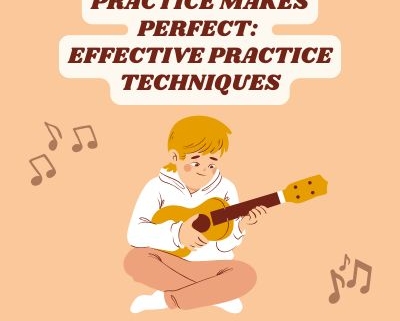Practice Makes Perfect: Effective Practice Techniques
Mastering a musical instrument requires dedication, patience, and, most importantly, effective practice. While the adage “practice makes perfect” holds true, the quality of practice often outweighs the quantity. Here are some effective practice techniques to help you or your students make the most out of practice sessions and achieve musical excellence.
Set Clear Goals
Before starting a practice session, it’s crucial to set clear, achievable goals. Whether it’s mastering a particular scale, working through a challenging piece, or improving a specific technique, having a defined objective provides direction and focus. Break down larger goals into smaller, manageable tasks to avoid feeling overwhelmed and to track progress more easily.
Create a Structured Practice Schedule
Consistency is key to improvement. Develop a structured practice schedule that includes daily sessions, even if they’re short. Regular practice helps build muscle memory and reinforces learning. Allocate specific times for different activities, such as warm-ups, technical exercises, repertoire practice, and sight-reading, to ensure a balanced approach.
Warm-Up Properly
Just like athletes, musicians need to warm up their muscles before diving into intense practice. Begin each session with gentle warm-up exercises that target the specific muscles used for your instrument. For pianists, this might include scales and arpeggios, while vocalists might start with breathing and vocal exercises. Proper warm-ups prevent injuries and prepare your mind and body for focused practice.
Practice Slowly and Accurately
One of the most effective ways to learn a new piece or technique is to practice slowly. Playing slowly allows you to pay attention to details such as finger placement, intonation, and rhythm. Gradually increase the tempo as you become more comfortable, ensuring accuracy at each speed. This method helps develop precision and prevents the formation of bad habits.
Use a Metronome
A metronome is an invaluable tool for developing a strong sense of timing and rhythm. Start practicing with the metronome at a slow tempo, then gradually increase the speed as you become more confident. Consistent use of a metronome helps you internalize the pulse of the music and improves your ability to stay in time, whether playing solo or with others.
Break Down Difficult Passages
When encountering a challenging section, break it down into smaller segments. Focus on a few measures at a time, practicing them repeatedly until they feel comfortable. Once each segment is mastered, gradually piece them together. This technique prevents frustration and allows for more efficient learning of complex passages.
Record and Evaluate Your Practice
Recording your practice sessions is an excellent way to objectively evaluate your progress. Listen to the recordings critically, identifying areas that need improvement. This self-assessment helps you become more aware of your strengths and weaknesses and provides a clear record of your development over time.
Incorporate Variety
Variety in practice routines keeps sessions engaging and prevents burnout. Alternate between different pieces, techniques, and styles to maintain interest. Incorporating a mix of technical exercises, improvisation, and performance practice can also help develop a well-rounded skill set.
Practice Mindfully
Mindful practice involves being fully present and focused during your practice sessions. Avoid distractions, set specific intentions, and concentrate on the task at hand. Mindful practice enhances the quality of your sessions, leading to more effective learning and greater progress.
Take Breaks and Rest
Finally, remember that rest is an essential component of effective practice. Taking short breaks during practice sessions helps prevent fatigue and maintains focus. Additionally, ensure you get adequate rest between practice sessions to allow your muscles and mind to recover.
Takeaways
Effective practice is a combination of clear goals, structured schedules, mindful techniques, and consistent evaluation. By incorporating these strategies into your practice routine, you’ll maximize your potential and make significant strides in your musical journey. Remember, it’s not just about the hours you put in but how you use those hours that truly counts. Happy practicing!
At Hodis Learning & Music, we offer personalized lessons designed to help you excel in your music studies while exploring the joys of practicing music. Whether you’re a beginner or an experienced musician, our tailored approach ensures that you get the most out of your lessons.
If you’re ready to bring your skills to the next level, consider signing up for music lessons. Call or email us today to get started.



